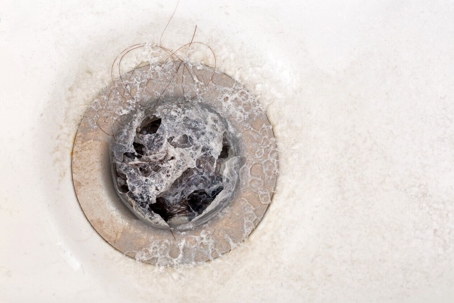Did you know that some residential drains are less than two inches in diameter? Considering how narrow most drain pipes are, it’s no wonder that clogs can form so quickly. Fortunately, preventing clogs in your home is simple, as long as you know what to do and not do.
HOW TO PREVENT PLUMBING CLOGS IN YOUR HOME
Use these tips and tricks below to keep blockages from forming in your home’s drain pipes.
1. Buy drain guards for your kitchen and bathroom.
Drain guards prevent food, hair, and other objects from going down your drains and forming clogs. These handy devices can also prevent you from losing fallen objects (like a wedding ring) in your home’s plumbing. When it comes to drain guards for tubs, we’ve seen fantastic reviews for the TubShroom, which claims that it’s “guaranteed to catch every single hair, every single time you take a shower.”
2. Collect used cooking oil in jars.
Pouring grease, oil, fat, or lard down your drains is a one-way ticket to “Clogville.” These substances congeal inside of your drains, coat the pipe walls, and cause nasty, smelly blockages. If you don’t want to dispose of leftover grease or oil directly into your garbage, you can collect it over time in a jar until you’re ready to dump it out with the trash.
3. Flush your kitchen sink with steaming hot water and dish soap.
Even if you try to keep grease out of your sink, your dirty dishes will transfer some to the drain when you wash them. Flushing your kitchen drain with hot water and dish soap will help loosen and break up those tiny bits of oil and grease, preventing clogs and bad smells.
4. Avoid the “baking soda remedy.”
Some people claim that you can clear a clog by sprinkling baking soda in your drain and pouring in some distilled white vinegar so the two will react. This will not help remove clogs deep down in your plumbing, which will need to be removed by plunging or snaking. Also, you run the risk of clogging your drain even more with too much baking soda.
5. Clean items covered with paint, grout, and mortar mix outside.
A weekend warrior should always wash their tools, but if those tools are covered in a substance that hardens (like grout, paint, or mortar mix), do not clean them indoors. While these substances might appear to go down your drains just fine, they will solidify in your pipes, making them narrower and easier to clog.
6. Limit the foods you put down the garbage disposal.
Despite what its name might imply, not just any garbage should be going down your garbage disposal. The only things that equipment should be “eating” are tiny food remnants. Avoid feeding it any starchy vegetables, as those tend to form a clog-causing paste. Foods that expand (like pasta and rice) are also infamous for creating blockages.
7. Don’t flush any trash but toilet paper.
Toilets are not manufactured to accommodate anything but human bodily waste and toilet paper. Some of the worst clogs are caused by flushing absorbent paper or cotton products, such as paper towels, facial tissues, makeup pads, personal wipes, and feminine hygiene products. Even wipes that are labeled “flushable” don’t break down in water as quickly as toilet paper, which can wreak havoc on your plumbing system--see the difference in this video.
8. Maintain your drains with sewer-jetting.
Even if you already have smart habits when it comes to your drains, you might encounter invasive tree roots and sediment building up inside your pipes, particularly down in your home’s sewer line. If this is an issue with your drains, you’ll want to consider sewer-jetting as a drain cleaning solution. Plumbers use sewer-jetting equipment to blast away the most stubborn debris and blockages with high-pressure water jets that they feed into your pipes with a hose. After a sewer-jetting treatment, the inner walls of your pipes will be clean as a whistle.
Do you need assistance tackling a tough clog? Our friendly plumbers at Rudd Plumbing are ready to help! For reliable drain cleaning services, give us a call at (903) 290-0851 or contact us online.

